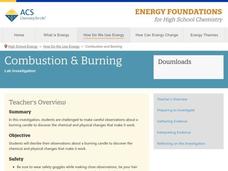Curated OER
Time and Earth History Socratic Questions
Students develop a sense of geologic ("deep") time and the ways in which Earth scientists construct the geologic time scale. They study he major events that shaped Earth, including the origin and evolution of its lithosphere, atmosphere,...
Curated OER
Graham Cracker Plate Tectonics
In this plate tectonics worksheet, students use Graham crackers, frosting, water and a paper plate to simulate tectonic processes such as convergent, divergent and transforming plate boundaries.
Curated OER
Earth Shaped by Water
In this Earth worksheet, students review the different ways water shapes the Earth's surface. This worksheet has 1 short answer and 10 matching questions.
Curated OER
Topographic Connections: Earth's Surface Shapes Streams; Streams Sculpt the Earth
Learners identify physical characteristics of developing streams and infer changes in the landscape by creating a river model.
Curated OER
How Does Flowing Water Shape a Planet's Surface?
Students investigate how flowing water influence landforms. In this earth science lesson, students observe water behavior as it flows from the stream table at various inclinations. They discuss whether water shaped Mars landforms or not.
Curated OER
Plants Letter Shapes
In this plant learning exercise, students write plant vocabulary words into word shapes after reading their definitions. Students write 8 plant vocabulary words.
Curated OER
Introduce Vocabulary: I Am Planet Earth
Students discover the meaning of tier two vocabulary words. In this vocabulary lesson, students read I Am Planet Earth, listening for 3 pre-select tier two vocabulary words. Words are defined by the teacher and students practice...
Curated OER
Rocks and Minerals
Students are able to describe earth processes (e.g., rusting, weathering, erosion) that have affected selected physical features in students, neighborhoods. They are able to identify various earth structures (e.g., mountains, faults,...
Curated OER
You're as Cold as Ice!
Learners study the movement of glaciers and how they have affected the Earth. In this geology lesson students simulate the effects glaciers have on landscape and watch video segments.
Curated OER
Four Color Map
Young scholars explore geometry by completing a color puzzle. In this shape identification activity, students utilize deductive reasoning to complete a Google SketchUp puzzle with trapezoid, triangles and rectangular shapes. Young...
Illustrative Mathematics
The Lighthouse Problem
Long considered the symbol of safe harbor and steadfast waiting, the lighthouse gets a mathematical treatment. The straightforward question of distance to the horizon is carefully presented, followed by a look into the different...
Curated OER
Environmental Studies: The Environment Rocks!
Rock exploration, so exciting! After reading the book Everybody Needs a Rock, the class makes sandwiches to better understand that the Earth is made in layers. They then use a description of the 3 types of rock to conduct an observation...
Curated OER
Environmental Benefits of Recycling
Fourth graders understand the benefits of recycling. In this recycling literacy activity, 4th graders read an article and identify the main idea. Students understand the process of transfer to the landfill and discuss how recycling helps...
Curated OER
Exploring the Water Cycle
The water cycle is one of earth's most easily observable processes, but demonstrating each step within classroom walls can be a challenge. Through a series of videos and quick demonstrations, cover each aspect of the hydrologic cycle in...
Channel Islands Film
Island Rotation: Lesson Plan 1
How do scientists provide evidence to support the theories they put forth? What clues do they put together to create these theories? After watching West of the West's documentary Island Rotation class members engage in a series of...
University of Colorado
Can Photosynthesis Occur at Saturn?
In the 19th activity of 22, learners determine if distance from a light source affects photosynthesis. Participants capture oxygen in straws and find that the amount of water the gas displaces is proportional to the rate of photosynthesis.
American Chemical Society
Combustion and Burning
On Earth, a candle flame points up, but on the International Space Station, it forms a sphere. Young scientists practice their skills by recording observations before, during, and after a candle burns. Chemical and physical changes...
Channel Islands Film
Arlington Springs Man: Lesson Plan 2
West of the West's documentary Arlington Springs Man and a two-page scientific article about the same topic provide the text for a reading comprehension exercise that asks individuals to craft a one page summary of information gathered...
Curated OER
Sandscapes to Landscapes
Students explore landscapes and create their own in a creative project.
Curated OER
What is the Rock Cycle and Its Processes?
Geology beginners examine three different rock samples and determine their origin by their characteristics. By making and recording observations, they become familiar with features of igneous, metamorphic, and sedimentary rock types....
Curated OER
King of the Mound
Students investigate water as an agent of change. They conduct an experiment involving a mound of soil, observe and record any changes that occur when ice melts on the mound of dirt, and create a drawing of the changes that take place...
Curated OER
"Water is Life" Global Water Awareness
Students examine and calculate the percentage of potable water remaining on the earth. In this ecology and geography lesson, students brainstorm the main factors affecting water distribution. Students use mathematical problem solving to...
Curated OER
2.0 "Water Is Life" Global Water Awareness Mini-Unit (Grades3-5)
Students study the amount of potable water on the Earth. In this water lesson plan, students examine the amount of potable water as compared to all the water on the Earth. They discuss why many parts of the world do not have access to...
Curated OER
Tracking Current "Earth" Events
Eighth graders utilize Internet research skills, and practice their communication skills by presenting their research to the clas. They actively consider the types of hazards for humans associated with Natural Disaters and ways that...

























